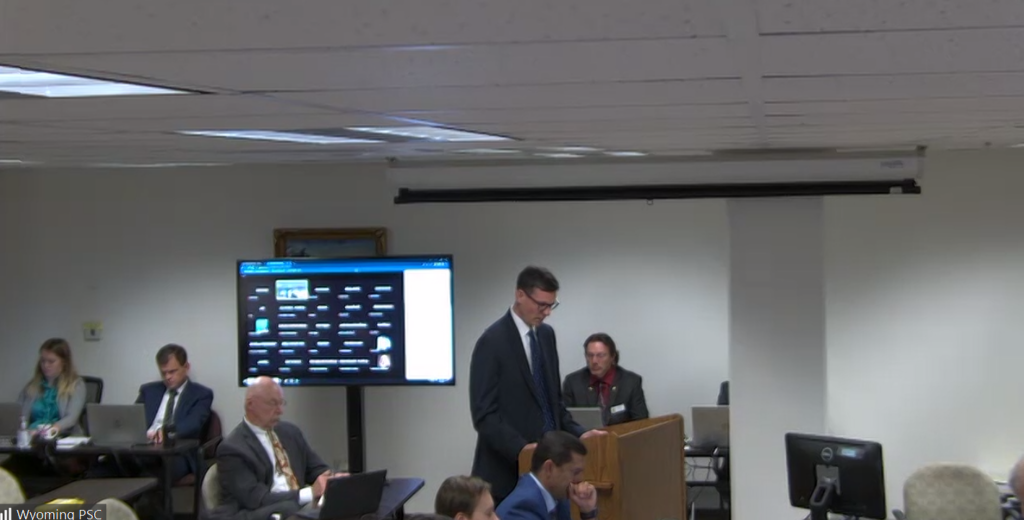Wyoming Public Service Commission Begins Hearings on Rocky Mountain Power Rate Hikes
Corporations committee to discuss related legislation
- Published In: Other News & Features
- Last Updated: Oct 27, 2023

Small power substations dot the prairie across rural Wyoming. (Wyoming Truth photo by Carrie Haderlie)
By Carrie Haderlie
Special to the Wyoming Truth
As the Wyoming Public Service Commission begins deliberating whether to approve a nearly 30% requested increase in electric rates for a quarter of the state’s population, lawmakers will discuss draft legislation regarding utility rate setting today.
The official deliberations come after months of public comment hearings across Wyoming, with some lasting hours. To date, no one who spoke at any of the hearings expressed support for the possible rate hikes.
During the Joint Corporations, Elections and Political Subdivisions Committee meeting today, lawmakers will review seven pieces of draft legislation regarding utilities in Wyoming. The proposed laws, which would take effect after the utility rate setting hearing decision is issued, would allow the Public Service Commission greater review of companies’ like Rocky Mountain Power’s integrated resource plans, as well as specify a maximum increase in electric costs that can be passed on to customers between rate cases.

Earlier this week, the Public Service Commission opened hearings in Cheyenne on Rocky Mountain Power’s requests for an increase of approximately $140.2 million per year (or 21.6%) to retail electric service rates and for the company to revise its energy cost adjustment mechanism by $50.3 million (or 7.6%).
Rocky Mountain Power has not presented a rate increase request to the Public Service Commission since 2012, Adam Lowney, legal counsel for Rocky Mountain Power, said on Wednesday as the eight-day evidentiary hearing opened.
“While the figure sounds daunting, even with the proposed rate increase, the company’s rates remain some of the lowest in the state and the region,” Lowney said. “The company’s residential rates will still be 35% less than the average rates provided by other service utilities.”
For a typical residential customer, the average monthly increase, if the general rate case is approved, would be $16.20. A subsequent energy cost adjustment, if approved, would mean an additional increase of $3.52 to a typical residential customer’s average monthly bill.
Around 95% of the increase is being sought due to “increased fuel costs and increased purchase power costs in the wholesale market,” according to the company. Lowney said high power costs can be attributed to higher wholesale electricity costs in the marketplace and rising natural gas and coal prices.
Rocky Mountain Power will present support for the increase that includes “hundreds of pages” of testimony from 18 witnesses, Lowney said, noting the company has responded to hundreds of discovery requests.
Between 2013 and 2022, Rocky Mountain Power’s overall rates rose by an average of 0.2% per year, according to Lowney. Calling that increase “modest,” he said Rocky Mountain Power was able to keep costs low, but market forces driving higher costs are out of the company’s control.

PacifiCorp, which does business in Wyoming as Rocky Mountain Power, has 2 million customers in six states and 141,400 square miles of service territory. In Wyoming, Rocky Mountain Power has 150,000 customers and 1,000 employees. The general rate case before the Commission was filed on March 1, 2023; if approved, it will become effective Jan. 1, 2024.
Thor Nelson, an attorney with Denver-based Holland & Hart, spoke on behalf of the Wyoming Industrial Energy Consumers, a group of large businesses that collectively consume the majority of the electricity sold by Rocky Mountain Power. The group’s membership, which opposes the increase, includes businesses that are critical to the long-term economic success of the state, Nelson said. For both Wyoming Industrial Energy Consumers members and “all Wyoming electric consumers of Rocky Mountain Power,” the proposed rate hike is “staggering,” he said.
The Wyoming Industrial Energy Consumers has historically worked to “reduce proposed increases in electric rates in Wyoming, especially for customers of” Rocky Mountain Power, according to its legal team. The Public Service Commission, Nelson said, must analyze the request by Rocky Mountain Power to judge whether the potential assessed rate is “just and reasonable.” The utility must prove the rate increase is just while public interest is taken as the first consideration, he added.
A cost should be reasonable in comparison to the benefit provided to the customers associated with that cost, Nelson said. That means the Public Service Commission must consider that the price Wyoming customers are willing to pay for electricity is high, because electricity is an essential service. However, customers often face a lack of choice in the marketplace, and utilities have no competition.
“You can see why the law in Wyoming gives the Commission the difficult job of … matching the cost incurred by the utility with the benefit it delivers to customers,” Nelson said.

Over 3,000 public comments logged and more likely to come
In September, the Joint Corporations Committee unanimously opposed the rate increase in a resolution sent to the Public Service Commission. Today, the committee will discuss, among other relevant legislation, a bill called “Electricity rates for costs that do not benefit Wyoming.” The proposed legislation is aimed at limiting the capital costs that companies like Rocky Mountain Power can pass on to Wyomingites. It asserts that capital costs climb as facilities are built to provide a specific mix of electricity generation technologies, including green energy, as required by other states, but not required in Wyoming.
At a pre-hearing conference on Monday, Commission-appointed hearing examiner Ivan Williams confirmed that companies and parties planning to participate in the eight-day hearing, in addition to Rocky Mountain Power, include the Sierra Club, Walmart, the Wyoming Office of Consumer Advocate and the Wyoming Industrial Energy Consumers.
“We will need to be efficient,” Williams said, noting there are 29 filed witnesses and 392 exhibits. “To date, we have received in excess of 3,200 public comments, and they keep coming.”
However, he said “not one of those comments says, ‘Hey, this is a good idea. Let’s do it’.”
Williams said public comment will be allowed each day from 11 a.m.-12 p.m.
The hearings are scheduled through Nov. 3 in the Commission hearing room at 2515 Warren Avenue, Suite 300, in Cheyenne. They are open to the public and accessible via Zoom.













